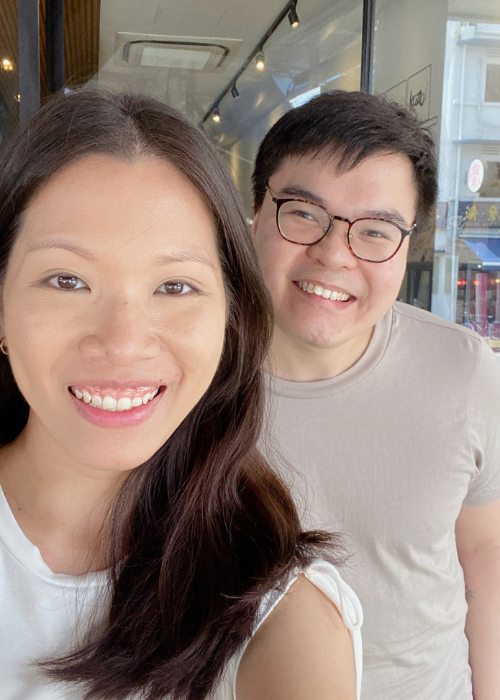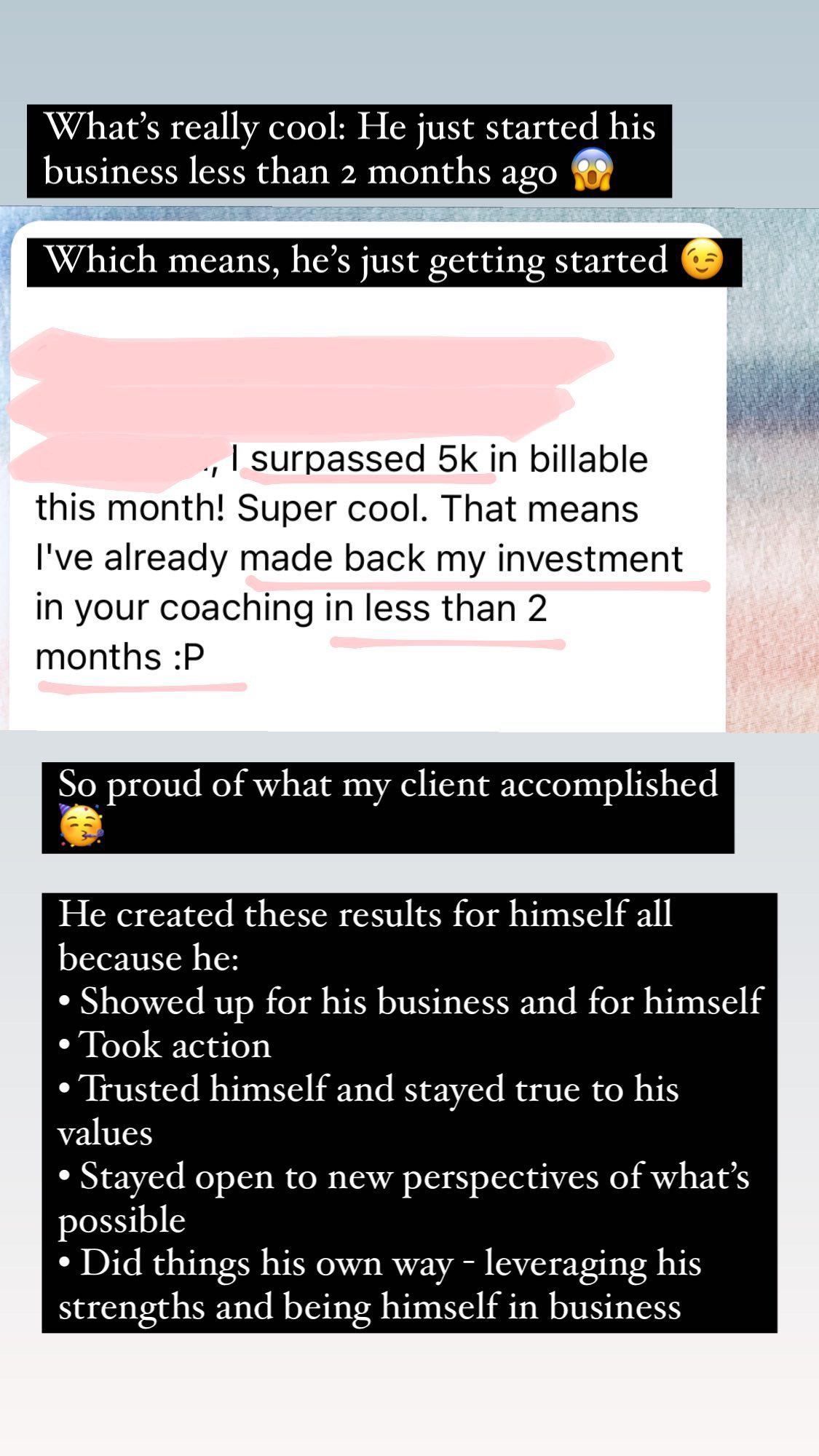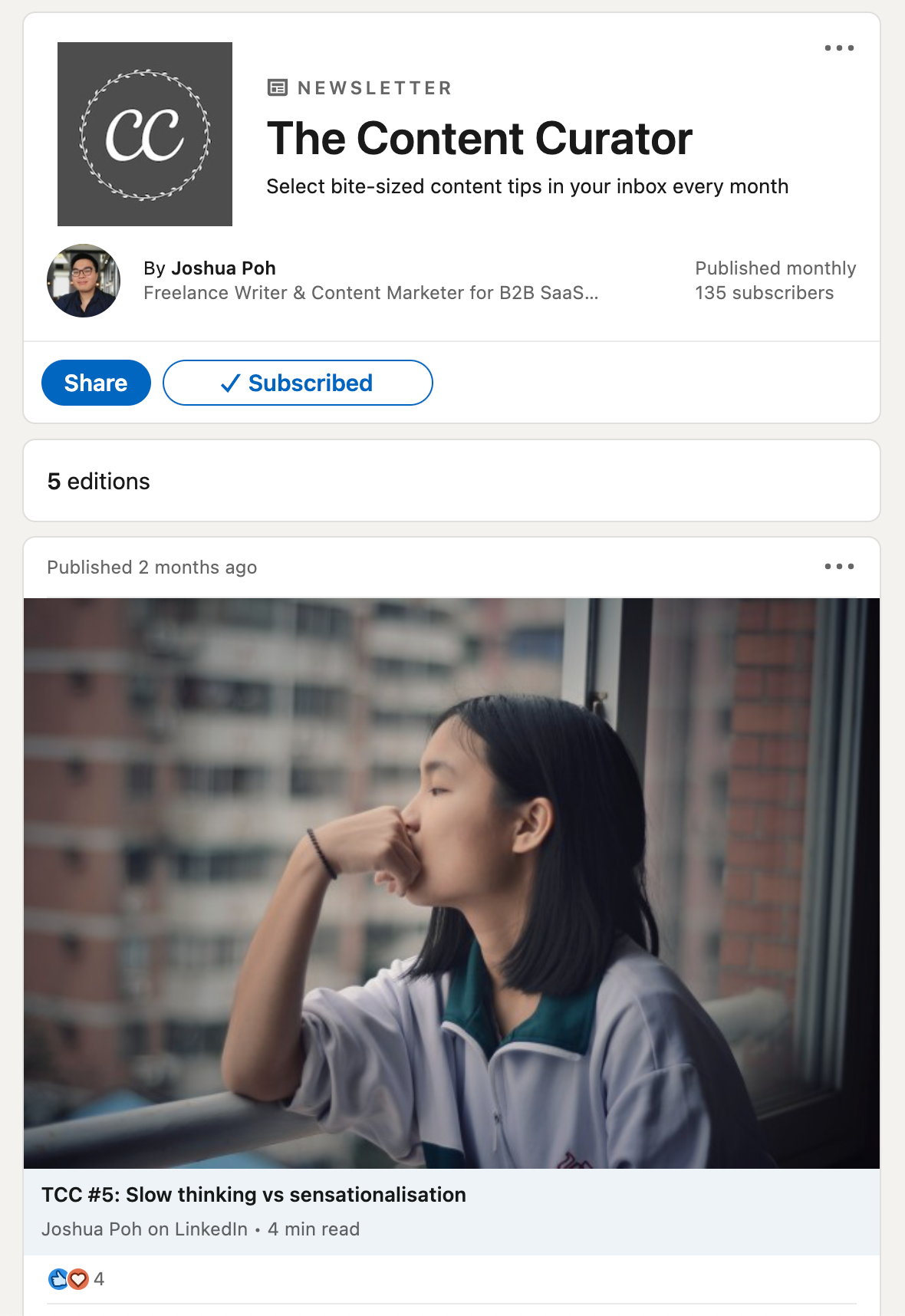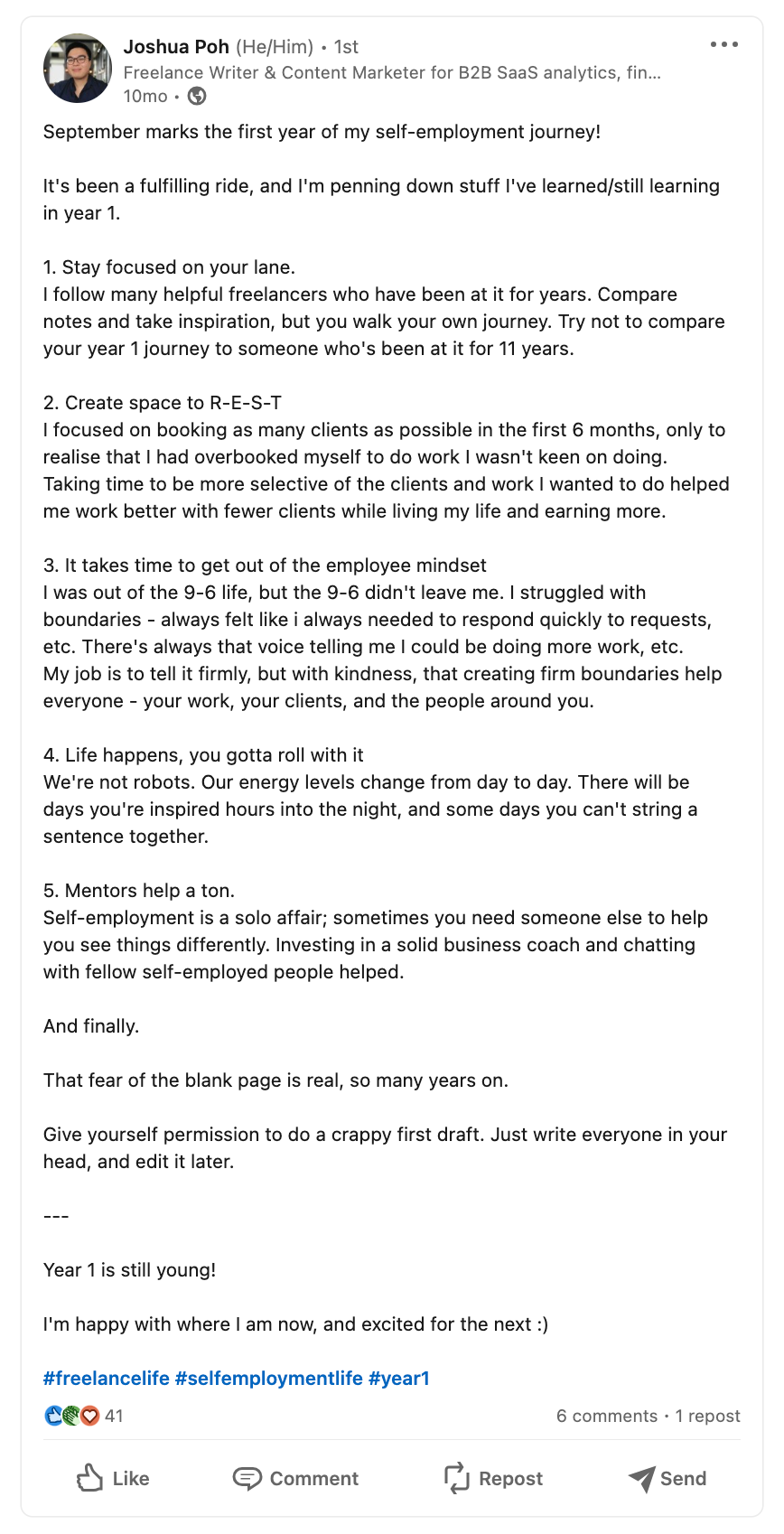Client Case Study: Creating a Freelance Business that Replaces Your Full-Time Income
Meet Joshua, a freelance writer & content marketer for B2B SaaS analytics, fintech and e-commerce companies, who surpassed his goals pretty quickly in his business.
Not only did he replace his full-time income, but he also discovered his own unique strategies to effectively market his services without relying on current marketing trends such as video marketing.
What sets Joshua apart is his commitment to work less hours and create freedom and flexibility to design his own schedule while at the same time, delivering amazing work for his clients. (Yes, it’s possible to do both!)
In this case study, we will delve into Joshua's inspiring journey, exploring the unique approaches he employed to surpass his income goals, embrace marketing in his own way, and create a fulfilling and sustainable freelance business.
We’ll break down the steps to Joshua's success and show you the mindset, strategies and practices that you can apply to transform your own freelance business.
Joshua and I recently caught up over lunch, 8 months after he completed the 1:1 Coaching Program.
It was so fun to hear about his business, life and travel plans.
And Joshua is also reaching 2 years in business! Time really flies.
In this case study
The Client’s Point-of-View:
Your return on investment on our coaching program and thoughts about investing in coaching
What was the biggest difference you experienced in your life because of your business?
What were the biggest mindset shifts and practices that helped you in your business?
A glimpse into what a week in the life of your business looks like currently
The Coach’s Point-of-View:
The Client’s Point-of-View
About Joshua
I’m Joshua, and I write long-form content (think blog posts, e-books, customer case studies and white papers) for growing business-to-business (B2B) companies in the e-commerce, digital analytics and fintech spaces.
My content has helped content teams nurture potential clients, improve product awareness and generate revenue in less time.
I enjoy cooking - especially soups and Japanese food!
I enjoy reading and playing video games; especially those with a strong narrative or roleplaying element. I also practise yoga and barre to stay active at home.
Connect with Joshua
Connect with me on LinkedIn and I’m happy to have a chat :)
If you need support on executing your content strategy or looking to get your time back on creating content so you can focus on other big-picture marketing tasks, book a pre-call questionnaire here.
For examples of what I’ve done for my clients, check out my work portfolio.
Why did you decide to start your business?
I was burned out of my full-time marketing roles after and being at the beck-and-call of my bosses after 5+ years.
I wanted to do something that allowed me a lot more flexibility and autonomy.
My wife had already been freelancing for two years and I knew it was a viable option to make a decent living, so I wanted to see how I would fare on the self-employed route.
What were your initial hesitations around coaching?
It was quite a significant investment given that I had barely started my business back then.
I was also wondering if I would stick with my business long enough to actually see results from coaching.
Why did you ultimately decide to work with a coach?
Being a self-employed person can get lonely at times, and having people around you exposes you to new ideas. I thought about investing in a coach to have an accountability partner and second pair of eyes as I run my business.
A recommendation from a freelancer friend led me to check out Esther’s resources and social media accounts.
I found I could identify with Esther’s story and approach of building a simple business that ebbs and flows with your energy/life stage, and eventually decided to sign up for her first consultation call where she gave me a lot of value.
Besides practical tips I could implement in the next hour, she also focused a lot on mindset which I wasn’t expecting.
I still remember the first time I shared my first income goal of SGD 1k/month. Esther asked me why I thought I couldn’t aim higher* - like replacing my full time income with fewer hours. This helped broaden my perspective, helping me firm up my decision to work with Esther.
*Esther’s Note: Full disclosure on why I asked Joshua why he didn’t aim higher. Based on his answers on the coaching application form and website, he was already working with clients and telling others about his business.
However, he wasn’t reaching SGD 1k/month with his current efforts and clients, so there were definitely opportunities to raise his rates and sign on more clients.
If he wasn’t working with any clients yet, my approach would have been different and I wouldn’t have asked him to aim higher.
Because monetary goals can be tricky. Setting a goal that goes way beyond what your mind can currently manage, can backfire on us. It’s happened to me several times.
Therefore, in our initial call (after you've filled in the application form), we discuss your current situation, your goals and what you’d like to achieve through coaching. There will be some coaching and new perspectives you’ll walk away with.
The purpose of the call is to understand if I can potentially support you and for you to make an educated decision about getting coached for the next 12 weeks. Basically, we want you to know what you’re getting yourself into!
Your return on investment on our coaching program and thoughts about investing in coaching
Over the 24 weeks we’ve worked together, I’ve made back over 5 times on the amount I’ve invested in the coaching program.
But beyond the numbers, the time and flexibility I now enjoy because of the lifestyle the business affords me is so much more valuable.
Plus, Esther focuses a lot on questioning and rewiring your thoughts - a lot of which, as a solopreneur, you bring to your life and business.
I 100% recommend investing in coaching, but only if you’re open and willing to do the work in between sessions.
Coaching isn’t a ‘magic pill’ that you can take and automatically get results, but there’s a lot of hard work in between to question your thinking, do the self-coaching, understand what you want to work on during each session and being open to change.
What was the biggest difference you experienced in your life because of your business?
I have a lot more flexibility in my life now.
My business has helped me take the time off I need to handle my personal affairs - whether it’s spending time with my wife or attending to personal affairs without needing to worry about getting my leave approved.
I work more efficiently as well because I can cater my days according to my energy levels and how I’m feeling, which is fantastic for a mentally taxing profession like writing and creating content.
What were the biggest mindset shifts and practices that helped you in your business?
Taking action imperfectly is better than perfect:
Especially important if you’re just starting out.
I’ve learned a lot about business more through taking action and making baby steps and iterating from there rather than spending time crafting the perfect email or strategy and trying to get it right from the start
Learn to schedule in time to rest and have fun:
When you feel good about your work and your business, you deliver better work and have happier clients.
For me, working around the clock worked for short bursts but it made for a poor long-term strategy as I would get irritable and the quality of work would drop.
I now work fewer hours than before, but I have the flexibility to scale up and down as and when I need it.
Expect mind drama if you run your own business:
Running your own business means you’re bringing a lot of inner beliefs, perspectives, mental blocks, strengths and weaknesses.
Mind drama is expected, as you’ll start running into these invisible barriers as you go about your day-to-day in business.
It’s really important to take time out to sit down with these feelings and work through them.
Not all growth needs to be revenue-based:
Sure, charging more and earning more money is always good.
But growth can also come as fewer hours worked, less mind drama around something hard, setting firmer boundaries, finding a new way to serve your clients better, getting a powerful customer testimonial, etc.
A glimpse into what a week in the life of your business looks like currently
I’m taking these few months to rest more and focus on things outside business so now a typical week goes like this:
Monday-Wednesday: Here’s when I get most of my client work done. I split these days into 2-3 blocks of researching and outlining, drafting and editing/reviewing per day. Each block can go between 1-2 hours each. I find I focus well up to about 3 hours per day.
Thursdays and Fridays are a bit more loosely structured: I focus on working on courses and reviewing the fundamentals of my business like brainstorming ideas and revamping my website. I also try to spend some time hanging out in Slack communities.
Or some days I get away from the computer and rest/do other things unrelated to my business - like catching up on hobbies, spending time with my wife, etc. Any client work I couldn’t get to in the week also goes here, but I try to keep one day free to focus on other aspects of the business as it helps me avoid burnout.
I used to work 7 days a week when I first started, but that quickly became unsustainable, so this strategy works better for me.
I shift these days around depending on my overall energy levels and what I have planned for the week.
The Coach’s Point-of-View
How Joshua hit his first milestone goal and continue to create amazing results
When we began working together, Joshua had a specific goal, and our focus was to help him achieve that milestone.
Within the first month of coaching, he not only hit but surpassed his initial goal of earning $1K/month.
It's important to note that Joshua was already taking consistent action even before we started working together. His website and LinkedIn profile were active. He was also telling people about what he does and is active in Slack communities and LinkedIn groups.
Once he achieved his initial goal of $1K/month, we proceeded step by step.
Very quickly, Joshua realised that some of the clients he was working with weren't the right fit and he was also getting overwhelmed taking on more work at his initial rates.
The two very common and normal scenarios for new freelancers are:
starting at a lower rate, then realising that the rate isn’t going to be sustainable in the long-term
taking on any and every client that comes along
Honestly, even if others may tell you that starting this way is a mistake, I beg to differ.
This is a really great way to start because it helps you to really understand how you want to price your services, who you really love to work with, what niche you’d like to go into and how you want to design your business around your life.
It really helps you to figure out what you want and don’t want - including a balance between the hours you want to work and how much you want to earn.
The real work comes from letting go of what you don’t want and asking for what you want. This includes laying down firm boundaries and setting up systems.
Now, the next step was to deliver outstanding work and raise his prices. Since his clients had signed up at different times (again, another totally normal scenario), it took a few months for him to implement the price increase across the board.
When it came to marketing, we continued with the strategy that was already working well for him. Since he was already active on LinkedIn and engaged in online communities, he didn't need to incorporate additional marketing activities.
He simply focused on his usual marketing activities, delivering awesome work for his clients and raising his rates.
As a result of his progress, he successfully replaced his 9-6 income in his business while working fewer hours.
He also gained the freedom and flexibility to design his own schedule.
Here's what I learned from his results:
He discovered his best way to communicate and reach out to people, leveraging his strengths in this area.
Even when uncertainty arose, he learned to take action regardless. He understood that done is better than perfect.
He stayed open to exploring new perspectives and ideas, recognizing that you won't know until you try.
Nevertheless, the process was not flawless. Life and business isn't linear or predictable at times, but Joshua was open to experimenting to see what worked for him and was patient with the process.
While gradually increasing his prices, we also focused on several crucial life and business priorities which contributed to Joshua’s overall success of designing his business around his life:
Identifying his ideal clients with crystal clarity
Letting go of clients who weren't a good fit
Shaping his thoughts and mindset around pricing, client communication, and boundaries
Providing exceptional service to existing clients
Streamlining and automating his business processes
Creating space and time for personal aspects of life
Prioritising rest and self-care in his schedule
My observation and insights on why Joshua got results
Joshua achieved an incredible milestone of replacing his 9-6 monthly income in his business while working fewer hours and enjoying greater freedom and flexibility in his schedule because:
He learned to trust himself and developed a process tailored to his needs.
He established boundaries in his business to safeguard his time and energy.
He exhibited a growth mindset and actively worked on developing his mindset.
He embraced a curious and inquisitive mindset, always seeking knowledge and asking questions.
He remained connected to his primary intention for starting his business.
These factors contributed to his results and overall success.
Why Joshua is able to confidently sign clients and raise his rates by marketing without video and in his own way
We found out that his best way to communicate and reach out to people is mainly through his writing. So we focused on leveraging his strengths in this area.
It’s so important to focus on what’s already working for you and maximise that.
Because adding new strategies often require time and effort to learn a new platform or skill. And that takes away your focus from your existing clients and efforts.
It’s so much easier and less overwhelming to understand your strengths, leverage that and continue with what’s already working.
But sometimes, we are unable to recognise what’s working for us and newer, “better” strategies are always more enticing. Stay focused!
Here’s how Joshua’s marketing strategy looks like:
I have 3 pillars for my marketing strategy:
1. My monthly curation newsletter: I curate a bunch of links and resources that I found interesting - they relate to content marketing and some issues my target clients face e.g dealing with AI as a content marketer, or content marketing during a recession.
It helps build a bank of content that enriches my LinkedIn profile and website (which is where prospects find me).
2. Personal posts on LinkedIn: Posting on LinkedIn is what got me my first few inbound clients.
I’ve found sharing personal stories about my self-employed journey or sharing cool stuff about marketing I find interesting (and that my audience might find value in).
3. Hanging out in Slack communities or LinkedIn: There’s a common thread here - I enjoy sharing cool things I find on the Internet, and this extends to communities I’m active in.
I take a few minutes in a week to check in on Slack communities and comment on recent posts on my LinkedIn timeline.
I’ve struggled with being consistent in these three elements, so now I try to block off at least 30 minutes in a week to focus on marketing.
Monetary vs non-monetary results: Why both matter
In Joshua’s own words:
The biggest positive change in 2022 was making space to live my life and enjoy my free time while running a business and still hitting my income goals.
I was able to take significantly more breaks and rest while doing more high quality work (and earnings thanks to raising my rates).
Thanks to working with Esther, I surpassed my initial growth and revenue targets, but the best takeaway is our focus on building a business to live our life.
And having that shift in mindset toward building my business is so much more valuable than hitting a growth target.
Create a business that enriches and compliments your life
Creating a business that enriches your life requires you to embrace the process of unlearning what we were taught are “best practices/expert advice” on building a business VS simply going through the “standard” process of building a business.
And also, understanding how to turn your strengths, personality and experiences into your best business assets.
Here are some areas we cover in our 1:1 Coaching Program to help you create a business that enriches and compliments your life, like Joshua:
Rest and scheduling time for rest
Create time and a flexible schedule to enjoy life things - Family, friends, passion projects, hobbies, travels, things you want to do
Pursue passion projects and hobbies - Actually experience these instead of putting them off. Your business supports these activities and in return, these activities give you energy and inspiration for your business and life.
Your business compliments your life and you get to do less in business - By removing all unnecessary tasks and focus only on a couple of revenue generating activities
Do things messy - Start fun projects, take action on random ideas, think less, do less and enjoy life.
Apart from these, we also focus on:
Marketing without video if video is not what you want to do
Raising your prices without objections
Making your full-time income on lesser hours
Doing your best work without getting burnt out






